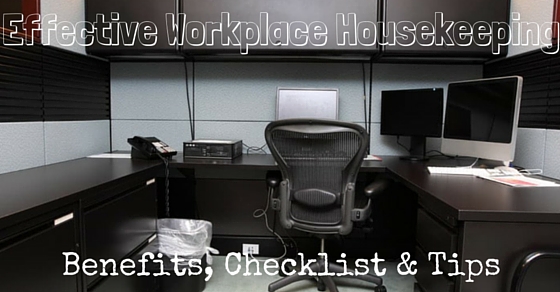The word ‘housekeeping’ generally brings to mind the normal chores like cleaning, dusting, arranging things and organizing clutter. But in the case of workplace housekeeping, it means way more than all this
The term ‘workplace housekeeping’ covers more aspects than the normal housekeeping and is very crucial and important for safeguarding the workplaces.
Office housekeeping helps in preventing injuries and improving a good workplace atmosphere. In many companies, it is the basic and important norm that workplace hygiene and cleanliness in the workplace should maintain and if the parameters not met, then the employer can liable to pay fines for non-compliance.

Workplace housekeeping should be extended to and practiced at all the workplaces like offices, warehouses, factories, and manufacturing units where there is a presence of dangerous materials, dust and other flammable things.
The whole idea behind the workplace housekeeping is to make the workplace a better, hygienic and safe place to work at. The importance of housekeeping has a vital role in the workplace safety program and to make this program successful, the employees must participate in and do the needful.
Why Maintain Good Housekeeping At Workplace?
Good housekeeping holds a very important position in the workplace as it helps in eliminating some workplace hazards. Proper safety also ensures good housekeeping by implanting safety procedures in the workplace.
Poor housekeeping can frequently contribute to accidents by increasing the risks of many kinds of hazards that cause injuries. If at the workplace debris, clutter and spills are accepted as normal then, in that case, there are chances for more serious health and safety hazards.
Housekeeping in the workplace refers to not only cleanliness but also includes the neatness in the workplace and all workplace safety procedures.
It includes maintaining halls and floors to make them free from trip and slip hazards; removal of waste materials and many kinds of other hazards.
Attention must pay to important details such as the layout of the whole workplace, adequacy of storage facilities, etc.
Why Workplace Housekeeping?
Inappropriate or poor housekeeping often leads to some disruptions at the workplace. It creates an unhealthy and non-desirous work culture and the overall efficiency of the employees tends to deteriorate. It can lead to many kinds of accidents, which can be stated as follows:
- In the case where various objects at the workplace not orderly arrange then there is always a fear of the employee tripping and tumbling over the loose objects which scatter on the floor due to negligence in proper housekeeping or the floors or the stairs which not properly cleaned.
- In case the objects not properly placed, there always remains a fear of hit by falling objects.
- Proper cleaning and mobbing of the floors are also important as it will avoid unnecessary tripping on the greasy, dirty or wet surfaces.
- Objects which poorly stack can hurt the employees if scattered vaguely.
Benefits of Good Housekeeping:
To avoid any kind of workplace hazard, they must be maintained orderly throughout the day. Although it’s quite a tedious job, it reaps too many benefits, some of them can be jotted down as under:
- It helps in lesser handling owing to regular maintenance.
- Lesser slipping and tripping as the workplace becomes a better manageable zone due to less clutter and spilling.
- Lesser fire hazards.
- The exposure to dangerous and hazardous substances reduced marginally.
- Improved control of materials and tools.
- Better and efficient maintenance and cleaning of the types of equipment.
- The overall hygiene of the workplace improved.
- Better utilization of available space.
- Less property damage.
- Improved morale.
- Improved productivity.
Elements of Workplace Housekeeping:
For a housekeeping procedure or plan to be effective, it needs to cover the following aspects/ elements:
Dust and Dirt Removal:
Many jobs have an open exposure to dirt, dust, etc. In such cases, due steps should take to remove such impurities from the atmosphere. If it’s not possible to clean the dirt and dust manually then in that case, proper machinery or ventilation plants should install to make the environment clean and fresh.
By using such kind of high capacity cleanliness machinery which comes with special fittings, aids in cleaning walls, machinery, ledges, etc, it is always easy to maintain a clean environment. There are available special kinds of vacuum cleaners as well which helps in removing the hazardous material; they should use when and where required.
Employee Facilities:
There are many numbers of facilities which provide to the employees. Washrooms, lockers, etc are some of them. It should make clear that the washrooms are cleaned multiple times in each shift, also it is important to make sure that there is an adequate supply of toiletries in the washrooms.
In the case where the employee exposes to hazardous materials, adequate facilities should provide which includes showers, changing rooms, washing facilities. The employer should provide the necessary facilities and take proper care of their employees.
It should see to and made sure that in the case where there is an exposure to toxic materials; there should be no smoking or drinking. A separate cafeteria/canteen should provide in such cases which should timely clean.
Surfaces:
Floors, walls, etc should keep neat and clean to avoid any kind of unforeseen danger. Where the floor conditions are poor, there stand chances for many kinds of unforeseen accidents.
It is mandatory and important to clean up the spilled oil, water or any other kind of liquid immediately. Where there has been cleaning done recently, there should be signage put up warning the employees about the wet floor.
In the case where regular cleaning cannot do, in that case, the flooring should make anti-skid. The walls should color light in color as it helps in reflecting light.
Maintain Light Fixtures:
The lighting source should clean from time to time as a cleaner source leads to better lightning. The dirtier the lightning source is, the dingier the workplace would look.
Stairways and the Aisles:
The aisles and staircases are one of the places wherein no unnecessary materials should dump. These places should keep neat and clean as messing up here means disruption in the free movement of the employees.
Also, in the case of emergency, if these places stay cluttered and piled up then it could lead to a major problem as those who affected would not able to move freely. Also, in the case of blind corners in aisles and staircase or the corridors, mirrors must use to ensure safe movement.
Spill Control:
Regular cleaning and maintenance should implement to avoid the hazards which can arise from spill damage. It should be taken care of that the employee is using drip pans, safety guards, etc wherever necessary.
Equipment and tools:
The tools and equipment should properly mark and stored. It should see that after the use of the tools and types of equipment, they safely returned. A regular inspection, repair, and cleanliness are some of the aspects to which attention should be paid.
Maintenance:
Maintaining buildings and equipment is one of the most important elements of good housekeeping. It should be taken care of that the equipment, buildings, machinery, etc are in good and operational condition.
Time to time repair and maintenance requires and should make to keep them in proper condition. It should be made sure that there are no broken windows, defective plumbing, damaged doors, etc. as all this makes the workplace a neglected place and vibrates negativity around.
Waste Disposal:
Waste disposal or scrap management is yet another important element of waste management. The unnecessary material or the scrap should dispose of properly according to the regulated manner.
Certain standards set up by lawmakers which need to adhere to at the time of disposing of the waste. For many kinds of waste, there are scrap management companies that buy off the scrap from the industries.
Storage:
Proper storage is one of the aspects which should look into to maintain a clean and healthy work environment. It should take care that there remains no unnecessary spillage, or clutter at the workplace, as all this leads to unforeseen accidents.
It is very important to store the stack drums and cartons on a solid foundation; they should also tie to avoid falling. The flammable, toxic and hazardous materials which can cause accidents should separately store and the area should mark as dangerous. The normal entry of others should prohibit.
Tips For Effective Workplace Housekeeping:
The following mention is a few housekeeping tips and housekeeping safety procedures that are to maintain for making a workplace effective.
Prevent trips, slips, and falls:
All due measures must take to avoid slips, trips, and falls at the workplace. Proper and timely cleaning should do and cleanliness should maintain. To prevent trips and slips, the aisles should be kept clean; the damaged and ripped flooring should be replaced.
Proper signage should use in case of wet floors. In addition to the above measures, anti-skid mats and should use wherever required.
Control dust:
Dust and dirt should remove from time to time and proper precautions should take to keep the work neat and clean. Professional vacuum cleaners should use to maintain proper hygiene at the workplace.
Proper storage:
The materials which store at the workplace should do so properly. This helps in removing the unnecessary clutter and also eases in finding out the material easily in case of need.
A proper workplace one wherein every material has a designated place to park and once done so; it makes the life of all those employees who use those materials a little better.
Precautions to take off while cleaning:
Those responsible for cleaning up the workplace should themselves follow certain standards and should be safeguarded against any kind of causality. Proper precautions and ethics need to be followed herein. Such safety measures may differ in various workplaces but one thing which stays the same is that these measures must be followed diligently.
Employees must own responsibility:
Each worker should be in charge of keeping their working area neat and tidy. If possible, they should report the safety hazards as soon as possible and should clean up the spills in their work area.
If each individual becomes a little vigilant and participates in keeping the workplace neat and clean, then a whole lot of resources of the organization can be saved.
Rules should be written:
Like other policies in the corporate, the housekeeping ones should also well define and written. This, in turn, would make the person responsible to follow them in line. Once the protocols are set and the rules are written it becomes easy to follow them.
Long-term planning:
Housekeeping needs to be an ongoing process and all due measures should be taken to maintain the sanity of the workplace. Regular audit, walkthroughs, and inspection schedules must be put in place which would in turn help in sustaining good housekeeping.
Do’s and Don’ts of Workplace Housekeeping:
DO’s:
- The floors should be kept clean and clear.
- The workplace should be adequately lighted.
- The light fixtures should be clean.
- The machinery and tools should be inspected regularly.
- The spills should be cleaned immediately.
DON’Ts:
- Do not use the staircase or the aisle as a storage area.
- No material should allow building upon the floors.
- The emergency exits shouldn’t block.







































